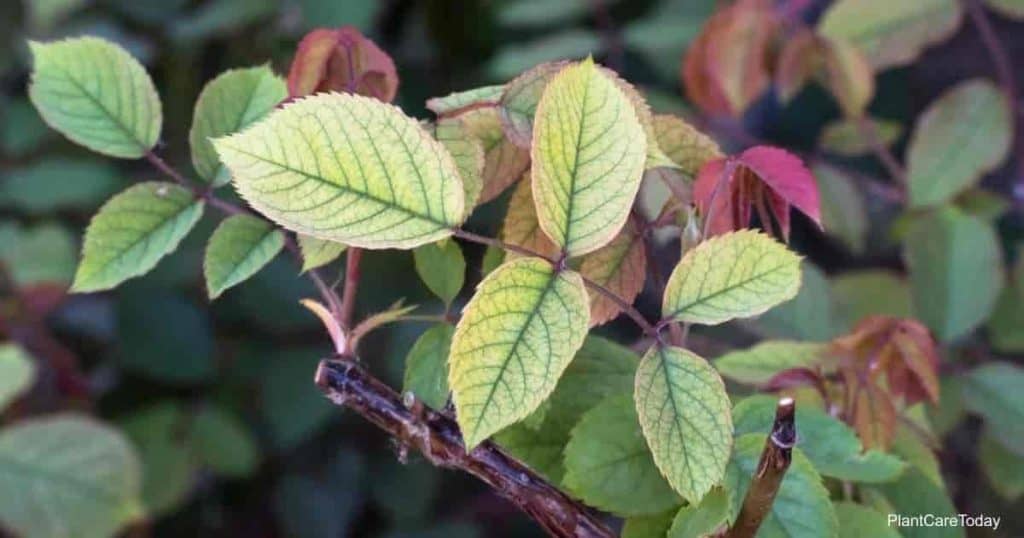If you’re into growing roses, you may have encountered yellow leaves on roses, a common issue that many gardeners face. It’s important to identify the cause and address it promptly.
This article looks at the most common causes of yellowing rose bush leaves and how to fix them.

Why Are My Rose Leaves Turning Yellow?
Yellow rose leaves or rose bush leaves turning yellow can be a sign of various problems, such as nutrient deficiencies, nitrogen or iron shortage, pests, diseases, rose mosaic virus, and high pH.
Other reasons might go back to mistakes when caring for roses.

In the following section, we’ll go through each one of these reasons and explain them.
Rose Mosaic Virus
Mosaic viruses hit different types of plants. When it comes to roses, the rose mosaic virus can come from viruses like the:
- Prunus necrotic ringspot virus
- Arabis mosaic virus
- Apple mosaic virus
The symptoms of rose mosaic include a decline in chlorophyll production which, in turn, causes the leaves to turn light green or yellow.
Unfortunately, there’s no cure for rose mosaic. Quickly separate infected plants from the others before the virus spreads.
Yellow Leaves On Rose Bush From Nitrogen Shortage?
Nitrogen is vital for plants. It plays an important role in plant growth. When there’s a nitrogen shortage, the rose bush leaves will start turning light green or yellow.
This usually happens because nitrogen drains away from the soil quickly, due to its water-soluble characteristics. When a rose plant doesn’t get enough nitrogen in its diet, the blooms will be smaller and the foliage will begin to yellow.

Make sure your rose bushes get a sufficient amount of nitrogen by applying rose fertilizers.
Rose Leaves Turning Yellow From Iron Shortage and Nutrient Deficiencies
Iron deficiency causes the areas between veins in the leaves to turn light green, yellow, or white. An iron shortage could be the result of your plants not getting enough oxygen, so the roots fail to absorb many elements, including iron.
This problem can escalate quickly and the leaves will start losing color fast. Soon the whole rose plant has yellow leaves.
You can fix this issue by adding peat moss and pine bark in the soil, as they are materials made of organic acid. Also, apply chelated iron for plants to help increase the iron available for the plant. Magnesium can also be a problem. Apply epsom salts to roses to improve the foliage color.
High pH
“pH” is the amount of acidity or alkalinity of the soil. All plants require a specific amount of pH to maintain their well-being. High pH causes many problems, including iron deficiency.

If the pH in the soil is too high, micronutrients will become less soluble, and the roots will fail to absorb them. As a result, the plant will start turning yellow.
Adding sulfur can help fix this problem as it is known to fix pH levels quickly when adding it to the soil or to the growing media.
Spider Mites
Spider mites can seriously harm your roses and cause their leaves to go yellow. Check on plants regularly to look for spider webs or any traces of insects.
If you find these pests, use an insecticide, soapy water, or a home remedy for spider mites on plants to spray it over your roses.
Roses Yellow Leaves From Mistakes in Rose Care – Possible?
It’s possible that the yellow leaves on rose bush are simply because of following wrong gardening practices.

Details: Learn about Black Spot on Roses
Here are some instances where you could unconsciously be harming your roses:
Overwatering or Underwatering
It’s funny that those two opposites can harm the plant equally. Just like you shouldn’t water your plant every hour, you shouldn’t let the soil totally dry out.
Both these mistakes will lead to plant decline, your rose bush leaves decaying, and its leaves turning into roses of yellow leaves.
Excessive or Now Fertilization
Take care of how much fertilizers you use on your roses. Too little fertilization means the plant won’t get enough of the nutrients it needs to grow well.
Likewise, if you fertilize your roses more than they need, it’s like suffocating them with elements they’ve gotten enough of.

You can always test the pH in the soil using a pH meter to know if the amount of nutrients your plant is getting is enough.
To avoid making fertilizer mistakes when growing roses, read our guide on rose fertilizers.
Next Steps
Roses make a great addition to your garden and make it all the more appealing. I know everyone gets this bad feeling when they see their roses yellowing.
Don’t worry, though, there’s always a solution. Go through the six reasons we’ve laid out and try to identify which one is behind your problem.
If you can’t tell what’s harming your roses, try visiting a gardening specialist to help you out.
May your plants always flourish!